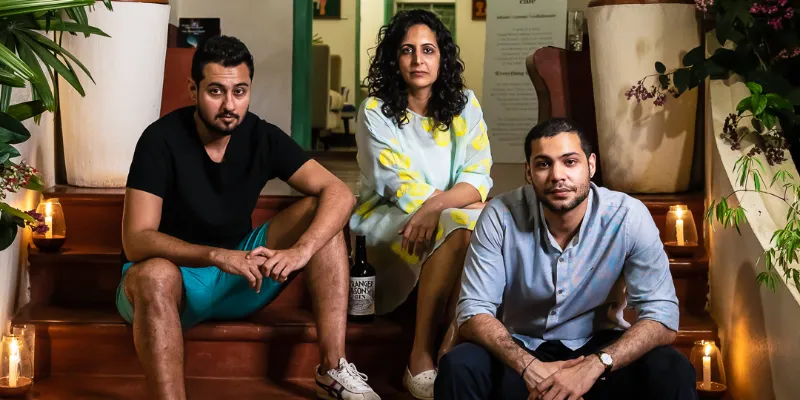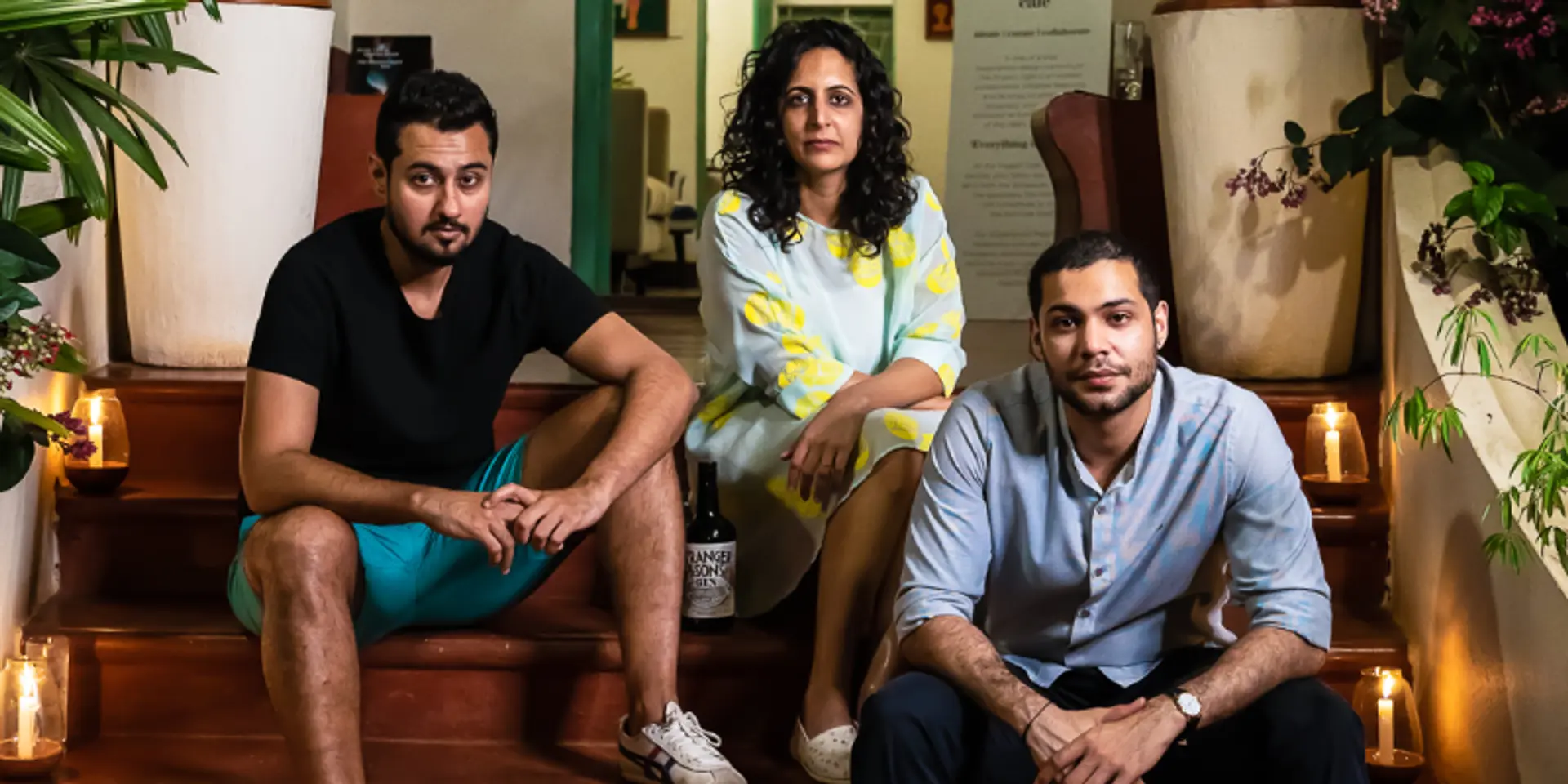Gin in a bottle: How this Goa-based startup is fomenting the gin revolution in India
In a country that favours brown liquors such as whiskey and rum, Stranger & Sons aims to carve out a niche for itself in the gin space. Currently present in Mumbai, Pune, Goa, London, Thailand, and Singapore, the startup says it plans to launch in Delhi, Bengaluru, Hyderabad, and Kolkata soon.
Two things come to mind when one thinks of gin: the hot priest from the webseries Fleabag and London – a city best known for its gin and tonic cocktail. Walk into any London speakeasy and you’ll be sure to find rows of gin bottles from all over the UK, as well as a myriad of gin-based cocktails listed on the menu. The gin and tonic cocktail is so widely consumed in England that pre-mixed cans of the beverage line shelves upon shelves in some of the country’s biggest supermarket chains.
In India, though, gin has an interesting history. Having relatively fewer takers compared to whiskey and rum, gin, up until a few years ago, was synonymous with imported bottles of Bombay Sapphire, Tanqueray, and Scotland-produced Hendrick’s. Ironically, the world-famous gin and tonic drink was originally created in India by the British East India Company to make quinine – a medicinal herb used as an antimalarial drug – more palatable. Indian soldiers were assigned a gin ration, and the alcohol slowly gained a small following in the country.
Post-independence, with a sharp focus on being self-sufficient and the importance given to ‘swadeshi’ products, gin was left to perish on the fringes and anything that circulated in the country was shipped over from England.
Today, that’s no longer the case.
Encouraged by India’s rising urbane population that’s increasingly demanding better quality, world-class liquor, homegrown boutique gin companies are slowly popping up and pouring one out for imported brands.

Founders of Stranger & Sons
One such company is Goa-based – founded by Sakshi Saigal, Rahul Mehra, and Vidur Gupta in 2018 – which aims to introduce Indians to well-made Indian gin using mostly locally sourced ingredients.
The startup’s gin is made up of an infusion of nine herbs and spices, as well as three types of citrus peels. It sources its junipers – the product from which gin derives its predominant flavour – from North Macedonia, while the herbs and spices come from different parts of India.
What chiefly helps gin work in India is its combination with tonic water:
“Gin and tonic (G&T), apart from being born here in India during the Colonial Raj, is a classic, easy-to-drink, easy-to-serve cocktail which works best for a hot tropical climate, and so it wasn’t too long before the Indian market started to witness a steady rise in imported gins. Today, we see a lot of Indian consumers are willing to try a good Indian product – the same goes for a good inherently Indian gin.” Sakshi Saigal, one of the startup’s Co-founders told YourStory in an interview.
The genesis of Stranger & Sons
All three founders of the startup have a background in the food industry – whether it’s Sakshi who studied distilling at a school in The Netherlands, Rahul who founded Gateway Brewing Co. and later, SVAMI – India's first brand of artisanal tonic waters and mixers, or Vidur, who worked with a premium health foods company, Eat Natural, in London, and later, at Gouri’s Goodies – a clean label brand which started in his mother's kitchen.
An inherently volumes-market, the Indian liquor industry is quite price-sensitive because of customers who prefer cheap and easily available brown liquours over expensive ones.
“If you look at the math and volumes behind the brands that fall in that category, we could be considered by many to be doing something stupid and risky,” quips Sakshi.
But over the last couple of years, consumers have been becoming pernickety about their liquors, preferring to consume quality stuff over what’s cheaply available, even if it comes at a slight premium. That has helped boutique alcohol brands like Stranger & Sons gain market traction, although the startup says the price tag, in its experience, does not matter these days.
“I believe as consumers grow more conscious of their consumption choices, they now have a long list of expectations from the brand and what it stands for before they make their choice - this is something we understand because we are such consumers ourselves. So whether we are premium for one set of our consumers, or affordable for another set – they choose us because they relate to what we do, and how we do it, rather than just the price tag on the bottle,” Sakshi adds.

Source: Stranger & Sons Instagram page
Why gin?
Gin currently forms only 1 percent of the 3 billion litres of alcohol consumed in India, per year, according to estimates shared by the startup. It is expected to report revenue of $1.76 billion in India in 2020, and grow by a CAGR of 10.6 percent, as per Statista’s evaluation.
Currently, the per capita consumption of gin in India stands at about 0.3 litres, Statista reported, adding that when adjusted for COVID-19, revenue from gin is expected to grow 14.2 percent in 2021.
For Stranger & Sons, even though the market is quite small right now, gin made sense because it was not only a spirit the founders enjoyed drinking themselves (talk about doing what you love!), but also it was a lean and open market which close to nobody knew how to crack.
“Add to this the diverse agricultural heritage of India, and having the most sought-after botanicals available in every corner of the country. Also, being one of the youngest nations on the planet with a wide set of people exposed to international cultures, we couldn’t think of any other time or place where making gin would make more sense,” says Sakshi.
Stranger & Sons’ product is unique in that it reimagines gin in the context of India.
“We wanted a Gin which showcased a rather peculiar side of India – something that had a robust London dry style backbone, but with a reimagined and unique expression of its own,” she adds.
Moreover, a lot of classic gin cocktails – such as the Gimlet and Last Word – have been making a comeback, and Indian bartenders are cashing in on the trend – even creatively concocting their signature drinks using different liquor combinations.
“Bartenders in India have been enjoying an unprecedented influence over the spirit that becomes a part of their bar, and with the rise of maker culture, and an overwhelming emphasis carefully chosen high-quality ingredients, a restaurant’s cocktail menu is fast becoming a significant contributor why people visit it in the first place,” says Sakshi.
Currently present in Mumbai, Pune, Goa, London, Thailand, and Singapore, Stranger & Sons says it plans to launch in Delhi, Bengaluru, Hyderabad, and Kolkata soon. It sells to restaurants, bars, liquor stores and online, directly to consumers, where it is permitted.
The founders seeded the startup with their personal savings, and raised a small pre-Series A funding a year after setting up. Its main competitors include Magic Moments vodka maker Radico Khaitan’s craft gin, Jaisalmer, and Nao Spirits.
Impact of the coronavirus
The startup says its sales took a hit in the first month of the nationwide lockdown, but, with some nimble footwork, it was able to harness online channels to drive growth.
The startup started receiving and accepting orders in May, and its distillery worked overtime to supply over 100,000 orders – its largest single export order ever.
Stranger & Sons says it also used the downtime to hammer out some creases in running the business.
“We haven’t had a single idle day - not one - and the moment the lockdown got lifted, the sales jump we experienced ensured that we more than made up for time lost,” says Sakshi.
Looking ahead, the startup says it has some interesting products lined up for the year, and, on the balance, it feels quite positive about its prospects.
“I don’t think there’s a single day that goes by when either one of us, at our homes currently, or Charnelle, our head distiller, isn’t tinkering with some new method or product. We definitely haven’t given up on 2020 as yet. I think this year will see some really exciting products and extensions from our stable. We always keep an eye out for trends and what’s really moving in the drinks space,” Sakshi says.
Edited by Kanishk Singh









